Among the five individuals with the highest IQs in Chinese history, Zhuge Liang ranks fifth. Four other extraordinary geniuses with exceptional intellect are placed above him.
Zhuge Liang (181 – 234), also known as Kongming, with the courtesy name Wuliao, was a brilliant strategist, politician, and diplomat in Chinese history. He is regarded as a founding hero and the Chancellor of Shu Han during the Three Kingdoms period.
During his farming days in Nanyang, he was able to know everything happening in the world without leaving his home. Later, when Liu Bei learned of Zhuge Liang’s remarkable reputation, he visited his thatched cottage three times, hoping to recruit this sage to serve under him.
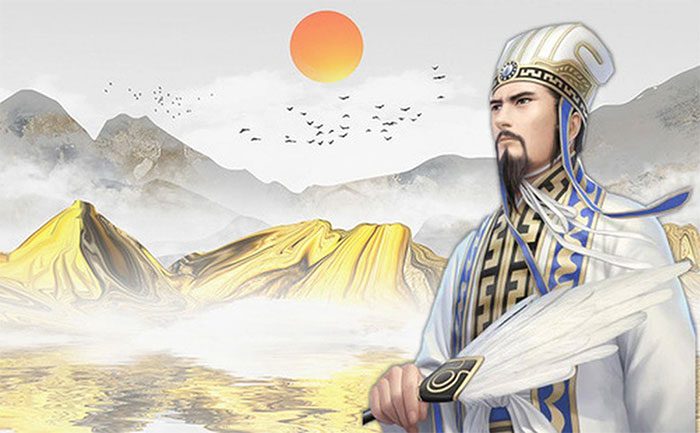
Zhuge Liang is a renowned strategist known for his extraordinary intellect (Photo: Weibo).
After “coming down from the mountain,” Zhuge Liang repeatedly demonstrated his superior intelligence, or exceptionally high IQ. Before the naval battle of Red Cliffs erupted, Zhuge Liang was assigned an almost “impossible mission” by Zhou Yu, the commander of Eastern Wu.
This task was to produce 100,000 arrows within ten days for the upcoming battle. Zhou Yu’s intent was clear: to eliminate Zhuge Liang and reduce a formidable opponent for Wu in the future.
Faced with this daunting situation, Zhuge Liang declared that he only needed three days to complete the mission, or he would accept death as punishment.
Zhuge Liang cleverly utilized the foggy weather, sending dozens of small boats covered in straw to challenge Cao Cao’s camp.
Seeing the shadow of the battle boats, Cao Cao’s troops quickly rained arrows down on the supposed enemy. The arrows stuck into the straw boats, allowing Zhuge Liang’s men to easily collect them. Thus, he successfully completed the task.
According to Sohu, despite Zhuge Liang’s intelligence and wisdom, there are still four “geniuses” in Chinese history with even higher IQs.
Zhang Liang
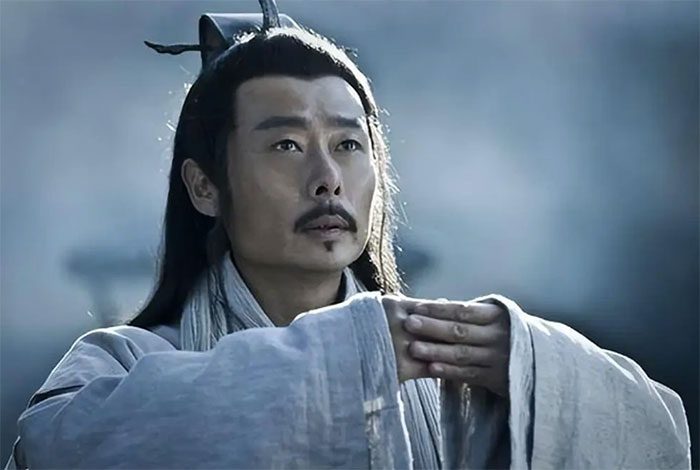
Zhang Liang ranks above Zhuge Liang in the IQ assessment (Photo: Sohu).
Among the five individuals believed to have the highest IQs in Chinese history, Zhuge Liang is ranked fifth. Placed above him at fourth position is Zhang Liang.
Zhang Liang was an advisor to Liu Bang during the Western Han Dynasty, known as the “seeker of wise men.”
According to Sima Qian’s Records of the Grand Historian and many other works, Zhang Liang met Liu Bang and became an important advisor, achieving numerous remarkable feats such as persuading Xiang Yu to help Liu Bang escape death, inciting uprisings against the Qin, and establishing contacts with Peng Yue, significantly contributing to Liu Bang’s ultimate victory.
Zhang Liang’s wisdom was evident not only on the battlefield but also in politics and diplomacy.
Later, when Liu Bang established the Han Dynasty, Zhang Liang chose to retreat, returning to his hometown to avoid overshadowing accomplishments. This demonstrated his extraordinary intellect and sagacity.
Fan Li
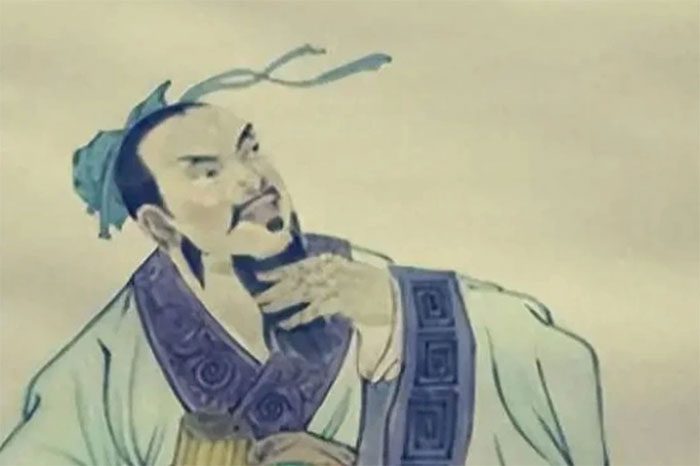
Fan Li is famous for his principle of “knowing when to stop and focus, knowing how to concentrate and remain calm” (Photo: Sohu).
Fan Li was known as the “merchant sage.” He played a key role in the restoration campaign during the time of Gou Jian.
After Gou Jian achieved fame, Fan Li cleverly withdrew and asked to return to his hometown, thus avoiding the fate of annihilation when he was no longer useful.
Fan Li later became wealthy through business, demonstrating his extraordinary intellect and life philosophy.
His success in the business world was due not only to his acumen but also to his understanding of the principle of “knowing when to stop and focus, knowing how to concentrate and remain calm.”
His success stories are still praised by future generations, becoming a model in the business community. It can also be said that his IQ is exceedingly difficult for others to match.
Jiang Ziya
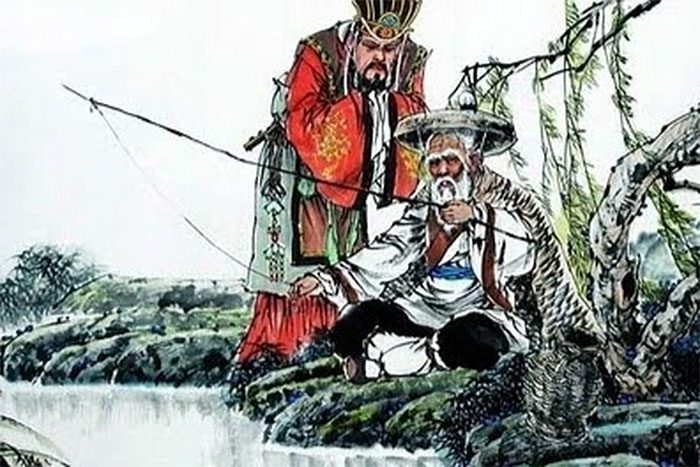
A painting of King Wen visiting Jiang Ziya while he is fishing, requesting his recruitment due to admiration for his talents (Photo: Sohu).
Jiang Ziya was a renowned strategist during the Shang and Zhou dynasties. While serving in the Shang, he realized that he was not valued, so he requested to retire and returned home to fish.
After King Wen of the Zhou Dynasty discovered Jiang Ziya’s talents, he personally came to recruit him. The famous painting of Jiang Ziya sitting alone on a rocky cliff, fishing with a bamboo rod, remains well-known to this day.
Jiang Ziya later repaid the trust placed in him by helping King Wen and King Wu overthrow the Shang Dynasty and establish the Zhou Dynasty.
His intellect was not only displayed in military matters but also in governance. He implemented a series of reforms that laid the foundation for the rapid rise of the Qi state.
His governing philosophy included “adapting to local customs, simplifying rituals, facilitating industry and commerce, and emphasizing agricultural products, fish, and salt.” This philosophy transformed Qi into a powerful state in a short time.
Jiang Ziya’s intellect and governance philosophy profoundly impacted future generations, earning him respect as a virtuous figure. He can be regarded as an all-knowing and all-powerful military advisor.
Guiguzi
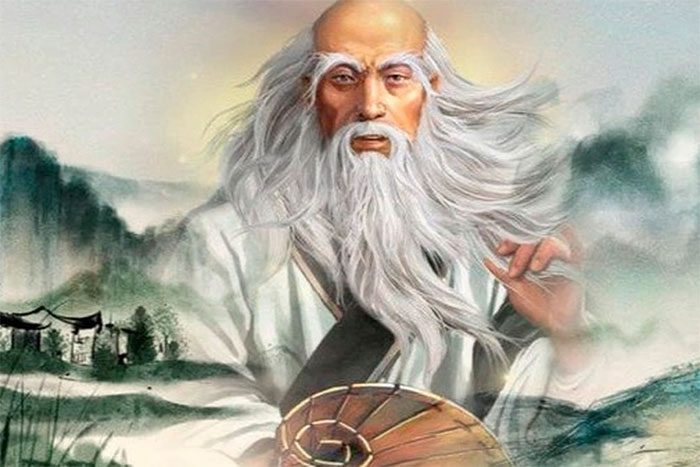
Guiguzi is the highest IQ figure in Chinese history (Photo: Sohu).
The individual with the highest IQ in Chinese history is Guiguzi, also known as Xuanwei Zi or Guiguzi Xiansheng, Wang Qian Laozu.
He was a politician, diplomat, yin-yang master, prophet, and influential educator during the middle of the Warring States period. His wisdom focused on the art of interaction between yin and yang, hard and soft, motion and stillness.
This method has been learned by later generations and is widely used not only in military strategy but also in fields such as astrology, determining latitude and longitude, and emotional intelligence.
He also trained many famous disciples, such as Zhang Yi, who had the ability to move “horizontally and vertically” to various states during the Warring States period using the technique of “integrating vertical and horizontal paths.” This technique even influenced the political structures of the time.
His disciples also included Sun Bin, renowned for his work “Sun Bin’s Art of War,” which has been applied by later generations in management, strategic business development, and personal transformation.
Guiguzi’s intellect was not confined to military and political matters. He also conducted in-depth research on astrology. His doctrine emphasized “the right time, the right place, and the right people,” focusing on comprehensive application in all aspects, making it widely applicable and practical.
The theories created by Guiguzi have profoundly influenced various fields such as politics, military, and culture in ancient China.




















































